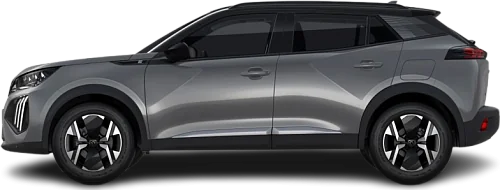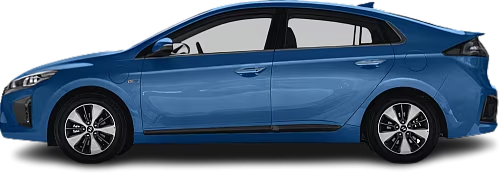Peugeot e-2008 54 kWh vs Hyundai Ioniq Electric Gen 1
Struggling to Decide? Let AI Help!
Your AI Summary Is Ready!
General Info
The Peugeot e-2008 54 kWh (2023-…) is currently produced, it has a starting price of €40000. The Hyundai Ioniq Electric Gen 1 (2016-2019) has been discontinued. You can find it for as low as €10990 on the used car market.
The Peugeot e-2008 54 kWh (2023-…) is a SUV, whereas the Hyundai Ioniq Electric Gen 1 (2016-2019) is a Liftback.
| Property | Peugeot e-2008 54 kWh | Hyundai Ioniq Electric Gen 1 |
|---|---|---|
| Years of Production | 2023-… | 2016-2019 |
| Current Status | Produced | Discontinued |
| Country of Manufacture | China, Spain | South Korea |
| Body Style | SUV | Liftback |
| Market Availability | EU | EU, USA |
| Price Europe (New) | €40000 | - Price Europe (New) |
| Price Europe (Used) | €32900 | €10990 |
| GCC Score | 5.5 | 4.8 |
Range and Efficiency
While the Peugeot e-2008 54 kWh (2023-…) offers a longer real-world range and a bigger battery, it is less energy-efficient than the Hyundai Ioniq Electric Gen 1 (2016-2019).
| Property | Peugeot e-2008 54 kWh | Hyundai Ioniq Electric Gen 1 |
|---|---|---|
| Range (EPA) | - Range (EPA) | 200 km |
| Range (WLTP) | 406 km | - Range (WLTP) |
| Range (GCC) | 345 km | 200 km |
| Battery Capacity (Nominal) | 54 kWh | 30.5 kWh |
| Battery Capacity (Usable) | 50.8 kWh | 28 kWh |
| Efficiency per 100 km | 14.7 kWh/100 km | 14 kWh/100 km |
| Efficiency per kWh | 6.79 km/kWh | 7.14 km/kWh |
| Range and Efficiency Score | 7.2 | 6.2 |
Charging
Both vehicles utilize a standard 400-volt architecture.
The Peugeot e-2008 54 kWh (2023-…) offers faster charging speeds at DC stations, reaching up to 100 kW, while the Hyundai Ioniq Electric Gen 1 (2016-2019) maxes out at 69 kW.
The Peugeot e-2008 54 kWh (2023-…) features a more powerful on-board charger, supporting a maximum AC charging power of 7.4 kW, whereas the Hyundai Ioniq Electric Gen 1 (2016-2019) is limited to 6.6 kW.
| Property | Peugeot e-2008 54 kWh | Hyundai Ioniq Electric Gen 1 |
|---|---|---|
| Max Charging Power (AC) | 7.4 kW | 6.6 kW |
| Max Charging Power (DC) | 100 kW | 69 kW |
| Architecture | 400 V | 400 V |
| Charge Port | CCS Type 2 | CCS Type 2 |
| Charging Score | 4.4 | 3.5 |
Performance
Both vehicles are front-wheel drive.
The Peugeot e-2008 54 kWh (2023-…) boasts greater motor power and accelerates faster from 0 to 100 km/h.
| Property | Peugeot e-2008 54 kWh | Hyundai Ioniq Electric Gen 1 |
|---|---|---|
| Drive Type | FWD | FWD |
| Motor Type | PMSM | PMSM |
| Motor Power (kW) | 115 kW | 88 kW |
| Motor Power (hp) | 154 hp | 118 hp |
| Motor Torque | 260 Nm | 295 Nm |
| 0-100 km/h | 9.1 s | 9.9 s |
| Top Speed | 150 km/h | 165 km/h |
| Performance Score | 2.9 | 2.8 |
Dimensions
The Hyundai Ioniq Electric Gen 1 (2016-2019) is longer and wider, but the Peugeot e-2008 54 kWh (2023-…) is taller.
The Hyundai Ioniq Electric Gen 1 (2016-2019) boasts a more extended wheelbase.
| Property | Peugeot e-2008 54 kWh | Hyundai Ioniq Electric Gen 1 |
|---|---|---|
| Length | 4304 mm | 4470 mm |
| Width (with Mirrors) | 1987 mm | 2045 mm |
| Width (w/o Mirrors) | 1775 mm | 1820 mm |
| Height | 1523 mm | 1450 mm |
| Wheelbase | 2562 mm | 2700 mm |
Cargo and Towing
The Peugeot e-2008 54 kWh (2023-…) provides more cargo capacity, featuring both a larger trunk and more space with the rear seats folded.
Neither car is equipped with a frunk (front trunk).
Neither vehicle is officially rated for towing in in the EU.
| Property | Peugeot e-2008 54 kWh | Hyundai Ioniq Electric Gen 1 |
|---|---|---|
| Number of Seats | 5 | 5 |
| Curb Weight | 1623 kg | 1495 kg |
| Cargo Volume (Trunk) | 434 l | 350 l |
| Cargo Volume (Max) | 1467 l | 1410 l |
| Cargo Volume (Frunk) | - Cargo Volume (Frunk) | - Cargo Volume (Frunk) |
| Towing Capacity | - Towing Capacity | - Towing Capacity |
| Cargo and Towing Score | 5.3 | 4.1 |




